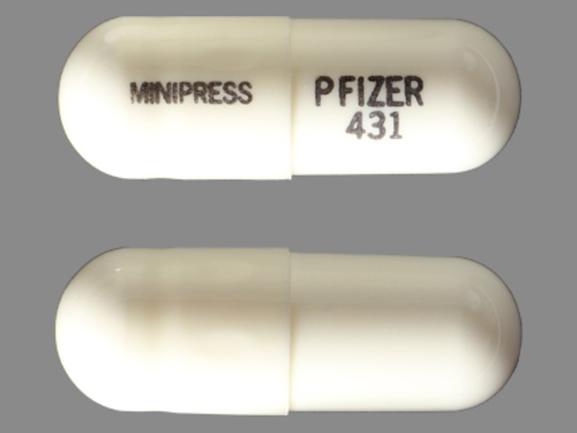Minipress Side Effects
Generic name: prazosin
Medically reviewed by Drugs.com. Last updated on Mar 29, 2024.
Note: This document contains side effect information about prazosin. Some dosage forms listed on this page may not apply to the brand name Minipress.
Applies to prazosin: oral capsule.
Serious side effects of Minipress
Along with its needed effects, prazosin (the active ingredient contained in Minipress) may cause some unwanted effects. Although not all of these side effects may occur, if they do occur they may need medical attention.
Check with your doctor immediately if any of the following side effects occur while taking prazosin:
More common
- Dizziness
- fast, irregular, pounding, or racing heartbeat or pulse
- sleepiness
Less common
- Blurred vision
- chills
- cold sweats
- dizziness, faintness, or lightheadedness when getting up from lying or sitting position
- swelling
- trouble breathing
Rare
- Bloating
- constipation
- darkened urine
- decreased interest in sexual intercourse
- fever
- inability to have or keep an erection
- indigestion
- loss in sexual ability, desire, drive, or performance
- loss of appetite
- nausea
- painful or prolonged erection of the penis for more than 4 hours
- pains in the stomach, side, or abdomen, possibly radiating to the back
- vomiting
- yellow eyes or skin
Incidence not known
- Arm, back, or jaw pain
- chest pain, discomfort, tightness, or heaviness
- confusion
- cough
- difficulty swallowing
- eye pain
- hives, itching, skin rash
- puffiness or swelling of the eyelids or around the eyes, face, lips or tongue
- slow or irregular heartbeat
- unusual tiredness or weakness
Other side effects of Minipress
Some side effects of prazosin may occur that usually do not need medical attention. These side effects may go away during treatment as your body adjusts to the medicine. Also, your health care professional may be able to tell you about ways to prevent or reduce some of these side effects.
Check with your health care professional if any of the following side effects continue or are bothersome or if you have any questions about them:
More common
- Headache
- lack of energy
- unusual drowsiness, dullness, or feeling of sluggishness
Less common
- Bloody nose
- diarrhea
- discouragement
- dry mouth
- feeling of constant movement of self or surroundings
- feeling sad or empty
- increased need to urinate
- loss of interest or pleasure
- nervousness
- passing urine more often
- sensation of spinning
- stuffy nose
- trouble concentrating
- trouble sleeping
Rare
- Burning, crawling, itching, numbness, prickling, "pins and needles", or tingling feelings
- continuing ringing or buzzing or other unexplained noise in the ears
- difficulty in moving
- hearing loss
- increased sweating
- loss or thinning of the hair
- muscle pain or stiffness
- pain in the joints
- seeing, hearing, or feeling things that are not there
Incidence not known
- Feeling of warmth
- lack or loss of strength
- redness of the face, neck, arms and occasionally, upper chest
- swelling of the breasts or breast soreness in both females and males
For Healthcare Professionals
Applies to prazosin: compounding powder, oral capsule.
General
The most common adverse reactions were postural hypotension, dizziness, headache, drowsiness, lack of energy, weakness, palpitations, and nausea.[Ref]
Cardiovascular
Very common (10% or more): Postural hypotension (up to 14%)
Common (1% to 10%): Palpitations, tachycardia, orthostatic hypotension
Uncommon (0.1% to 1%): Angina pectoris
Rare (less than 0.1%): Bradycardia, flushing, hypotension, vasculitis
Frequency not reported: Angina exacerbation, myocardial infarction[Ref]
Nervous system
Very common (10% or more): Dizziness (up to 10.3%)
Common (1% to 10%): Drowsiness, headache, faintness, syncope, vertigo
Uncommon (0.1% to 1%): Paresthesia, tinnitus
Rare (less than 0.1%): Narcolepsy worsened[Ref]
Other
Common (1% to 10%): Lack of energy, weakness, asthenia
Rare (less than 0.1%): Fever, pain
Frequency not reported: Malaise[Ref]
Gastrointestinal
Common (1% to 10%): Constipation, diarrhea, dry mouth, nausea, vomiting
Uncommon (0.1% to 1%): Abdominal discomfort and/or pain
Rare (less than 0.1%): Pancreatitis[Ref]
Respiratory
Common (1% to 10%): Dyspnea, nasal congestion, epistaxis[Ref]
Psychiatric
Common (1% to 10%): Depression, nervousness
Uncommon (0.1% to 1%): Insomnia
Rare (less than 0.1%): Hallucinations[Ref]
Ocular
Common (1% to 10%): Blurred vision, sclera reddened
Uncommon (0.1% to 1%): Eye pain
Frequency not reported: Pigmentary mottling, serious retinopathy, cataract development, cataract disappearance[Ref]
Genitourinary
Common (1% to 10%): Urinary frequency, impotence
Rare (less than 0.1%): Incontinence, priapism[Ref]
Dermatologic
Common (1% to 10%): Rash
Uncommon (0.1% to 1%): Diaphoresis, pruritus, urticaria
Rare (less than 0.1%): Alopecia, lichen planus[Ref]
Metabolic
Common (1% to 10%): Edema[Ref]
Musculoskeletal
Uncommon (0.1% to 1%): Arthralgia[Ref]
Immunologic
Rare (less than 0.1%): Allergic reaction, positive antinuclear antibody titer[Ref]
Endocrine
Rare (less than 0.1%): Gynecomastia[Ref]
Hepatic
Rare (less than 0.1%): Liver function abnormalities[Ref]
More about Minipress (prazosin)
- Check interactions
- Compare alternatives
- Reviews (14)
- Drug images
- Dosage information
- During pregnancy
- Generic availability
- Drug class: antiadrenergic agents, peripherally acting
- Breastfeeding
- En español
Patient resources
Professional resources
Related treatment guides
References
1. Product Information. Minipress (prazosin). Pfizer U.S. Pharmaceuticals. 2001;PROD.
2. Cerner Multum, Inc. UK Summary of Product Characteristics.
3. Cerner Multum, Inc. Australian Product Information.
Further information
Always consult your healthcare provider to ensure the information displayed on this page applies to your personal circumstances.
Some side effects may not be reported. You may report them to the FDA.

